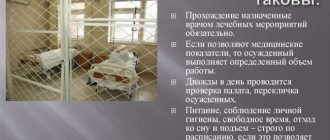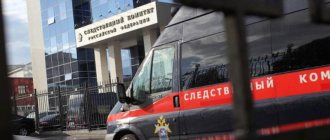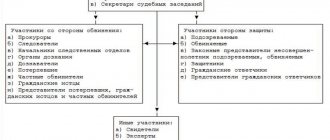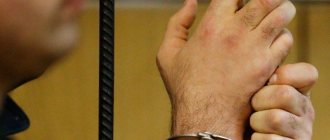Article 190 of the Penal Code of the Russian Federation. Responsibility of probationers (current version)
1. If a conditionally convicted person evades the fulfillment of the duties assigned to him by the court, evades compensation for damage (in whole or in part) caused by the crime, in the amount determined by a court decision, by concealing property, income, evading work or in another way, or if he violates public order, for which he was brought to administrative responsibility, the criminal-executive inspection or the command of a military unit warns him in writing about the possibility of revoking his suspended sentence. Evasion of compensation for damage caused by a crime also includes failure to compensate for such damage for unjustified reasons.
2. If a conditionally convicted person fails to comply with the requirements specified in part four of Article 188 of this Code, as well as in the presence of other circumstances indicating the advisability of assigning other duties to the conditionally convicted person, the head of the penal inspection or the command of a military unit makes a corresponding submission to the court. Information about the debt of a conditionally convicted person under executive documents on compensation for harm caused by a crime may be submitted to the victim by the victim to the penal inspection or the command of a military unit.
3. If there are sufficient grounds, the criminal-executive inspection or the command of the military unit sends a proposal to the court to extend the probationary period.
Advertisement probation and execution of punishment imposed by a court verdict.
5. A systematic violation of public order is the commission by a probationer of two or more violations of public order within one year, for which he was brought to administrative responsibility. Systematic failure to fulfill duties is the commission of prohibited or failure to perform actions prescribed to a conditionally convicted person more than twice within one year, or prolonged (more than 30 days) failure to fulfill the duties assigned to him by the court.
6. A conditionally convicted person whose location has not been established for more than 30 days is recognized as absconding from control.
President of the Russian Federation B. YELTSIN
Moscow Kremlin
January 8, 1997
N 1-FZ
Everything about criminal cases
Go to the text of the PEC
Url Additional information:
Part
I
- Part 1 190 PEC
in case of evasion of duties - a written warning
- Part 1 190 PEC
evasion of compensation for harm - failure to compensate for such harm
Part
II
- Part 2 190 PEC
may be assigned additional responsibilities (through the court)
Part
III
- Part 3 190 PEC
probationary period may be extended
Part
IV
- Part 4 190 PEC
probation can be revoked
Part
V
- Part 5 190 PEC
systematic - violation of public order
- Part 5 190 PEC
systematic - failure to fulfill duties
Part
VI
- Part 6 190 PEC
in 30 days the location is unknown - that means he is hiding
Article 190 of the Penal Code. Responsibility of probationers
1) If a conditionally convicted person evades the fulfillment of the duties assigned to him by the court, evades compensation for damage (in whole or in part) caused by the crime, in the amount determined by a court decision, by concealing property, income, evading work or in another way, or if he violates public order, for which he was brought to administrative responsibility, the criminal-executive inspection or the command of a military unit warns him in writing about the possibility of revoking his suspended sentence.
Evasion of compensation for damage caused by a crime also includes failure to compensate for such damage for unjustified reasons.
Url Additional information:
— clause 13
Plenum No. 21 cancellation, addition of duties
2) If the conditionally convicted person fails to comply with the requirements specified in Part 4 188 of the Penal Code, as well as in the presence of other circumstances indicating the advisability of assigning other duties to the conditionally convicted person, the head of the penal inspection or the command of the military unit makes a corresponding submission to the court. Information about the debt of a conditionally convicted person under executive documents on compensation for harm caused by a crime may be submitted to the victim by the victim to the penal inspection or the command of a military unit.
3) If there are sufficient grounds, the penal inspection or the command of the military unit sends a proposal to the court to extend the probationary period.
Url Additional information:
— clause 9
Plenum No. 21 cancellation of probation
4) If a conditionally convicted person, during the probationary period, systematically violated public order, for which he was brought to administrative responsibility, systematically failed to fulfill the duties assigned to him by the court, or escaped from control, then the head of the penal inspection or the command of a military unit sends a motion to the court to cancel probation and execution of punishment imposed by a court verdict.
5) A systematic violation of public order is the commission by a probationer of 2 or more violations of public order within 1 year, for which he was brought to administrative responsibility.
Systematic failure to fulfill duties is the commission of prohibited or failure to perform actions prescribed to a conditionally convicted person more than 2 times within 1 year, or prolonged (more than 30 days) failure to fulfill the duties assigned to him by the court.
Url Additional information:
— clause 9
Plenum No. 21 is proven to be a fact of concealment from control
6) A conditionally convicted person whose location has not been established for more than 30 days is recognized as absconding from control.
Return to the text of the PEC
Seek advice
Article 97. Travel of persons sentenced to imprisonment outside correctional institutions
Article 97. Travel of persons sentenced to imprisonment outside correctional institutions
[Criminal Executive Code] [Special Part] [Section IV] [Chapter 13]
. Those sentenced to imprisonment, held in correctional colonies and educational colonies, as well as convicts left in accordance with the established procedure in pre-trial detention centers and prisons to carry out housekeeping work, may be allowed to travel outside the correctional institutions:
- a) short-term, lasting up to seven days, not counting the time required for travel there and back, due to exceptional personal circumstances (death or serious illness of a close relative that threatens the life of the patient; a natural disaster that caused significant material damage to the convicted person or his family), as well as for preliminary resolution of issues of labor and everyday life of the convicted person after release;
- b) long-term for the duration of annual paid leave, and for convicted persons specified in part two of Article 103 of this Code, or for convicted persons who are not provided with work for reasons beyond their control, for a period equal to the time of annual paid leave.
. Convicted women who have children in children's homes of correctional colonies may be allowed to travel outside the correctional institutions to place their children with relatives or in an orphanage for up to 15 days, not counting the time required for travel there and back.
2.1. Convicted women who have a disabled minor child outside the correctional colony, as well as convicted men who have a disabled minor child and are the only parent, may be allowed four trips per year to visit the child for a period of up to 15 days each, not counting the time necessary for travel there and back.
2.2. Convicted women who have a child under 14 years of age outside a correctional colony, as well as convicted men who have a child under 14 years of age and are a single parent, may be allowed two trips per year to visit the child for a period of up to 10 days each, not counting the time required to travel there and back.
. Travel on the grounds specified in parts one - two.2 of this article are not allowed to convicted persons in case of particularly dangerous recidivism of crimes; convicts for whom the death penalty by way of pardon has been replaced by imprisonment; sentenced to life imprisonment; convicts suffering from an open form of tuberculosis; convicts who have not completed the full course of treatment for sexually transmitted diseases, alcoholism, substance abuse, drug addiction; HIV-infected prisoners, as well as in cases of anti-epidemic measures. Travel on the grounds specified in parts two - two.2 of this article is also not permitted to convicts recognized in accordance with Article 116 of this Code as malicious violators of the established procedure for serving a sentence; convicted of a crime against minors; convicted for crimes under Articles 205 - 205.5, parts three and four of Article 206, part four of Article 211, articles 228, 228.1, part two of Article 228.2, part two of Article 228.3, articles 228.4 - 230, 231 - 234, parts two and three Article 234.1, Article 361 of the Criminal Code of the Russian Federation, and crimes associated with the implementation of terrorist activities, provided for in Articles 277 - 279 and 360 of the Criminal Code of the Russian Federation, as well as for convicted persons whose deferment of serving their sentence was canceled by the court on the basis of part two of Article 82 of the Criminal Code of the Russian Federation Federation.
. Convicts suffering from mental disorders that do not preclude sanity, convicts who are disabled in the first or second group and require outside care for health reasons, as well as juvenile convicts, are allowed to travel outside the correctional institution accompanied by a relative or other accompanying person.
. An application by a convicted person for short-term travel outside a correctional institution due to exceptional personal circumstances must be considered within 24 hours.
. Permission to travel outside the correctional institution is given by the head of the correctional institution, taking into account the nature and severity of the crime committed, the time served, the personality and behavior of the convicted person.
6.1. If a convict is given permission to leave the correctional institution, the administration of the correctional institution immediately notifies the victim or his legal representative about this, if the convict’s personal file contains a copy of the ruling or court order notifying the victim or his legal representative about the convict’s departure from the correctional institution. .
. The time during which the convicted person is allowed to leave the correctional institution is counted towards the term of serving the sentence.
. The convict's expenses in connection with leaving the correctional institution are paid by him from his own funds or by other persons. While the convict is outside the correctional institution during a short-term departure, he is not paid wages.
. In the event of unforeseen circumstances that make it difficult for the convict to return within the prescribed period, by decision of the head of the internal affairs agency at the place of residence of the convict, the period of return to the correctional institution may be extended to five days with mandatory urgent notification of this to the administration of the correctional institution.
. The procedure for allowing convicts to travel outside places of deprivation of liberty is determined by the Internal Regulations of Correctional Institutions.
. If a convicted person evades returning to a correctional institution within the prescribed period, he is subject to detention by the internal affairs body at the place of residence of the convicted person with the sanction of the prosecutor for a period of no more than 30 days to resolve the issue of sending him to the place of serving his sentence under escort or bringing him to criminal responsibility.
. The departure of convicted persons to the territory of another state is permitted in the manner and in cases provided for by agreements with the relevant states.
Criminal Executive Code of the Russian Federation:
Article 190. Liability of conditionally convicted persons
1. If a conditionally convicted person evades the fulfillment of the duties assigned to him by the court, evades compensation for damage (in whole or in part) caused by the crime, in the amount determined by a court decision, by concealing property, income, evading work or in another way, or if he violates public order, for which he was brought to administrative responsibility, the criminal-executive inspection or the command of a military unit warns him in writing about the possibility of revoking his suspended sentence. Evasion of compensation for damage caused by a crime also includes failure to compensate for such damage for unjustified reasons.
2. If a conditionally convicted person fails to comply with the requirements specified in part four of Article 188 of this Code, as well as in the presence of other circumstances indicating the advisability of assigning other duties to the conditionally convicted person, the head of the penal inspection or the command of a military unit makes a corresponding submission to the court. Information about the debt of a conditionally convicted person under executive documents on compensation for harm caused by a crime may be submitted to the victim by the victim to the penal inspection or the command of a military unit.
3. If there are sufficient grounds, the criminal-executive inspection or the command of the military unit sends a proposal to the court to extend the probationary period.
Advertisement probation and execution of punishment imposed by a court verdict.
5. A systematic violation of public order is the commission by a probationer of two or more violations of public order within one year, for which he was brought to administrative responsibility. Systematic failure to fulfill duties is the commission of prohibited or failure to perform actions prescribed to a conditionally convicted person more than twice within one year, or prolonged (more than 30 days) failure to fulfill the duties assigned to him by the court.
6. A conditionally convicted person whose location has not been established for more than 30 days is recognized as absconding from control.
Return to the table of contents of the document: Criminal Executive Code of the Russian Federation in the current edition
Commentary on Article 86 of the Criminal Executive Code of the Russian Federation
1. According to Part 1 of the commented article, in cases of convicts resisting the staff of correctional institutions, malicious disobedience to the lawful demands of the staff, displaying violence, participating in mass riots, taking hostages, attacking citizens or committing other socially dangerous actions, as well as to prevent these those convicted of harming others or themselves use physical force, special means and weapons.
Resistance by convicts to the staff of correctional institutions should be understood as their active actions that create a threat or directly threaten the life and health of the staff of the institution, as well as negatively impact the psyche or make it difficult or impossible for the staff to carry out legal activities.
Malicious disobedience of convicts to the legal demands of personnel can manifest itself in the form of both passive and active actions. The concept of “malicious disobedience” in this case implies repeated failure to comply with the legal requirements of the administration. This failure to comply may be accompanied by statements of insults, obscene language addressed to staff, other hooligan actions, as well as the commission of violent acts.
2. Employees of the penal system use physical force, special means and weapons on the territories of institutions executing sentences, adjacent territories where security requirements are established, and on protected facilities in the manner prescribed by the Law of the Russian Federation “On institutions and bodies executing criminal penalties in the form of imprisonment" and other laws.
When using physical force, special means and weapons, correctional officers are obliged to:
1) warn of the intention to use them, providing sufficient time to fulfill their requirements, except for those cases where delay in the use of physical force, special means and weapons creates an immediate danger to the life or health of personnel and other persons, as well as convicts and prisoners, may entail other serious consequences or when such a warning in the current situation is inappropriate or impossible;
2) ensure the least harm to convicts and prisoners, providing medical care to victims;
3) report to the immediate superior about each case of the use of physical force, special means and weapons.
In case of necessary defense or extreme necessity, employees of the penal system, in the absence of special means or weapons, have the right to use any available means.
In the event of injury or death of convicts, prisoners, or other persons as a result of the use of physical force, special means or weapons, the heads of institutions executing punishments report this to the prosecutor.
3. Employees of the penal system use special means in the following cases:
1) to repel attacks on employees of the penal system, convicts, prisoners and other citizens;
2) to suppress mass riots, group violations of public order by convicts and prisoners, as well as to detain offenders who show malicious disobedience or resistance to personnel;
3) to release hostages, seized buildings, structures, premises and vehicles;
4) when escorting and protecting convicts and prisoners, when their behavior gives reason to believe that they can escape or cause harm to others or themselves;
5) for the detention and return of convicted persons and prisoners who have escaped from custody or from an institution executing punishments.
The following can be used as special means:
- rubber sticks;
- handcuffs. In the absence of handcuffs, employees of the penal system have the right to use improvised means of binding;
— light and sound distraction devices;
— means of destroying barriers;
- water cannons and armored vehicles - only on the instructions of the head or deputy head of the institution executing punishment, the pre-trial detention center, with subsequent notification of the prosecutor within 24 hours from the moment of their use;
- service dogs.
The types of special means and gas weapons, as well as the intensity of their use, are determined taking into account the current situation, the nature of the offense and the personality of the offender. The use of special means and gas weapons should be limited to causing minimal harm to convicts, prisoners and other persons.
It is prohibited to use special means and gas weapons against women with visible signs of pregnancy, persons with obvious signs of disability and minors when their age is obvious or known, except in cases of armed resistance, a group or other attack that threatens the life and health of citizens, and also in cases where unauthorized citizens may suffer from this.
4. Employees of the penal system have the right to use firearms:
1) to protect against an attack that threatens the life and health of citizens;
2) to repel an attack that threatens the life and health of employees of the penal system, convicted prisoners and other persons, as well as to repel an attack in order to seize weapons;
3) to release hostages, seized buildings, structures, premises and vehicles;
4) to repel a group or armed attack on protected objects, premises and structures of institutions executing punishment, as well as on vehicles;
5) to detain a person offering armed resistance, caught committing a serious crime against the life, health of citizens, property and trying to hide, escaping, or to suppress attempts to forcibly release convicts and prisoners, as well as to detain an armed person who refuses to comply with a legal requirement an employee of the penitentiary system about the surrender of weapons.
In addition, firearms can be used:
- to stop a vehicle used by a convicted person or prisoner to escape;
- to warn convicts, prisoners and other persons of the intention to use firearms, to sound an alarm and call for help.
Employees of the penal system have the right to draw firearms and bring them into readiness if they believe that in the current situation the grounds for their use provided for in this article may arise.
Without warning, firearms are used:
1) when repelling an attack using weapons or vehicles;
2) when convicts and prisoners escape from places of deprivation of liberty, pre-trial detention or from custody with weapons, using vehicles or from a vehicle while driving;
3) when a convicted person or prisoner, as well as another person, attempts to approach an employee of the penal system with a naked firearm or bladed weapon or objects with which bodily harm can be caused, while reducing the distance indicated by the employee of the penal system, and also while attempting to touch his firearm.
When using firearms, employees of the penal system are obliged to take all possible measures to ensure the safety of citizens, as well as to provide medical assistance to victims.
It is prohibited to use firearms against women with visible signs of pregnancy, persons with obvious signs of disability and minors, when their age is obvious or known, except in cases of armed resistance, an armed or group attack that threatens the life and health of citizens, and also in cases when outsiders may suffer from this.
Employees of the penitentiary system are required to report each case of the use of firearms to their immediate superior within 24 hours from the moment of its use.
The administration of an institution or body of the penal system immediately notifies the prosecutor of each case of the use of firearms.
AZ-libr.ru
Article 86. Security measures and grounds for their application 1. In cases of convicts resisting the staff of correctional institutions, malicious disobedience to the legal requirements of the staff, displaying violence, participating in mass riots, taking hostages, attacks on citizens or committing other socially dangerous actions, as well as When escaping or detaining convicts who have escaped from correctional institutions, physical force, special means and weapons are used in order to suppress these illegal actions, as well as to prevent these convicts from causing harm to others or to themselves. 2. The procedure for applying the security measures specified in part one of this article is determined by the legislation of the Russian Federation.Comm. Seliverstov V.I.
1. The new European Prison Rules (2006) recommend that prisons be maintained in a safe and disciplined manner while respecting the human dignity of prisoners. Based on this, it is established that security measures should only be applied in exceptional circumstances in compliance with the procedures established by national legislation. The application of security measures in each case must be determined by the competent authority for a certain period of time. 2. Article 86 of the Penal Code of the Russian Federation establishes the types of security measures: physical force, special means and weapons, which are used to suppress the listed illegal actions of the convicted person, as well as to prevent harm to others and to oneself. Part 2 of the commented article contains a blanket rule, according to which the procedure for applying security measures is determined by the legislation of the Russian Federation. Currently, the procedure for applying security measures to convicted persons is regulated by the Law of the Russian Federation “On institutions and bodies executing criminal penalties in the form of imprisonment.” This Law defines, first of all, the category of persons who have the right to use physical force, special means and weapons. These are employees of the penal system who have special ranks of rank and file and command. The listed security measures and weapons are used on the territory of institutions executing punishment, adjacent territories where security requirements have been established, and at protected facilities. 3. When using physical force, special means and weapons, the following conditions must be observed: a) warning of the intention to use them, providing sufficient time to fulfill their requirements, except in cases where delay in their use creates an immediate danger to the life and health of personnel and military personnel internal troops, as well as convicts and prisoners, may entail other grave consequences or when such a warning in the current situation is inappropriate or impossible; b) ensuring the least harm to convicts and prisoners, providing medical care to victims; c) informing the immediate superior about each case of the use of physical force, special means and weapons. In a state of necessary defense (Article 37 of the Criminal Code of the Russian Federation) or extreme necessity (Article 39 of the Criminal Code of the Russian Federation) in the absence of special means or weapons, personnel have the right to use any available means. In the event of injury or death of convicts, prisoners or other persons as a result of the use of physical force, special means or weapons, the heads of correctional institutions report this to the prosecutor. 4. Article 29 of the above Law defines the grounds for the use of physical force against convicts, including Sambo combat techniques. It is allowed to detain convicts, suppress not only crimes, but also disciplinary offenses committed by convicts or other persons, if the fulfillment of their legal demands is not ensured in a non-violent way. Article 30 of this Law regulates in detail the cases of permissibility of the use of special means and gas weapons by employees: - to repel attacks on correctional facility workers, convicts, prisoners and other citizens; — to suppress mass riots, group violations of public order by convicts and prisoners, as well as to detain offenders who disobey or resist staff; - to free hostages, seized buildings, premises and vehicles; - when escorting and protecting convicts and prisoners, when their behavior gives reason to believe that they can escape or cause harm to others or themselves; - for the detention or return of convicts and prisoners who have escaped from custody or from a correctional institution. 5. Article 30 of this Law lists the types of special means used to convicts: handcuffs, light and sound distraction devices, means of destroying barriers, water cannons and armored vehicles, service dogs, gas weapons. Special means and gas weapons, as well as the intensity of their use, are determined taking into account the situation, the nature of the offense and the personality of the offender. The use of special means and gas weapons is prohibited against women with visible signs of pregnancy, persons with obvious signs of disability and minors when their age is obvious or known, except in cases of armed resistance, a group or other attack that threatens the life and health of citizens, and also in cases where unauthorized citizens may suffer from this. 6. Article 31 of this Law provides a detailed list of cases in which the use of firearms against convicted persons is permitted: - to protect against an attack that threatens the life and health of citizens; - to repel an attack that threatens the life and health of correctional workers, convicts, prisoners and other persons, as well as to repel an attack with the aim of seizing weapons; - to free hostages, seized buildings, structures, premises and vehicles; — to repel a group or armed attack on protected objects, premises and structures, as well as vehicles; - to detain a person offering armed resistance, caught committing a serious crime against the life, health of citizens, property and trying to hide, escaping, or to suppress attempts to forcibly release convicts and prisoners, as well as to detain an armed person who refuses to comply with the lawful demand of an employee about the surrender of weapons; - to stop a vehicle used by a convicted person or prisoner to escape; - to warn convicts, prisoners and other persons of the intention to use firearms, sound an alarm and call for help. Firearms are used without warning: - when repelling an attack using weapons or vehicles; - when convicts and prisoners escape from places of deprivation of liberty, pre-trial detention or from custody with weapons, using vehicles or from a vehicle while driving; - when a convicted person, or a prisoner, or another person tries to approach an employee with a naked firearm or bladed weapon or objects that can cause bodily harm, while reducing the distance specified by the correctional officer, as well as when trying to touch his firearm . 7. The Law of the Russian Federation “On institutions and bodies executing criminal penalties in the form of imprisonment” establishes restrictions on the use of weapons. It is prohibited to apply to women with visible signs of pregnancy, persons with obvious signs of disability, minors when their age is obvious or known, except in cases where they provide armed resistance, commit an armed or group attack that threatens the life and health of citizens, and also in cases where This may cause harm to outsiders. Within 24 hours from the moment of its use, a correctional officer must report each case of the use of firearms to his immediate superior or the head of the internal affairs agency at the place where the weapon was used.






